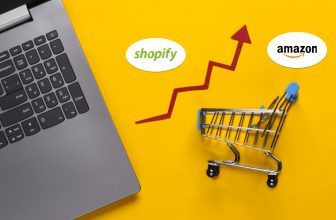
In today’s highly competitive market, businesses need to have an online presence to stay relevant. E-commerce apps have become a crucial tool for businesses to reach customers, improve sales, and build brand awareness.
Developing an e-commerce app can be challenging, but with the help of Flutter, businesses can create high-quality apps that can give them a competitive edge in the market. In this article, we will discuss how Flutter e-commerce apps can help businesses win the market competition.
Cross-Platform Development
Flutter e-commerce apps are built with cross-platform development capabilities, meaning that businesses can develop an app once and deploy it on multiple platforms. This saves time and costs and allows businesses to reach a wider audience.
Flutter offers a single codebase for both iOS and Android, which streamlines the development process and ensures consistent performance across platforms.
Customizable User Interface
Flutter offers a wide range of customizable widgets which you can use to create stunning user interfaces for e-commerce apps. With Flutter’s flexible layout system, developers can easily design UIs that adapt to different screen sizes and device orientations.
This allows businesses to create a unique and engaging shopping experience for their customers. A user-friendly interface is critical for the success of e-commerce apps, and Flutter’s customizable widgets make it easy to create an intuitive and visually appealing app.
Fast Development With Applicable Of Hot Reload
Flutter’s Hot Reload feature is a game-changer for developers, allowing them to see any ongoing changes in the code segment in real time.
This significantly speeds up the development process and enables developers to experiment with different design ideas and features quickly. This is especially useful for e-commerce apps, which often have complex features and require frequent updates.
Integration with Third-Party APIs
Flutter integrates seamlessly with third-party APIs, making it easy to add functionality and features to e-commerce apps quickly.
Payment processing, shipping tracking, and social media integration are just a few examples of the many APIs available to businesses. This allows businesses to create a robust e-commerce app with features that cater to the needs of their customers.
Improved Performance and Security
Flutter e-commerce apps are built with performance and security in mind. Flutter’s reactive programming model allows for a smooth and responsive user interface, and its built-in security features ensure that customer data is protected.
Flutter provides developers with access to secure storage and encryption APIs, which can help protect sensitive customer information.
Tips for Building a Successful Flutter E-commerce App
User-Friendly Design
The design of an e-commerce app should be user-friendly and intuitive, with easy navigation and a clear layout. Ensure that the app is easy to use and understand, with clear descriptions and images of the products. Incorporate user feedback to improve the design and functionality of the app.
Optimize for Performance
To ensure a smooth and seamless experience for users, e-commerce apps need to be optimized for performance.
Make sure to use efficient code and reduce unnecessary animations and transitions. Perform regular testing to identify and fix performance issues.
Personalization
Personalization is crucial for e-commerce apps, as it helps build customer loyalty and increases sales.
Use data analytics to gather information about customers’ preferences and shopping habits, and tailor the app’s recommendations and promotions accordingly. This can improve the customer experience and encourage repeat purchases.
Payment and Shipping Options
Offer a variety of payment and shipping options to cater to the needs of different customers.
Ensure that the payment processing is secure and reliable, and provide tracking information for shipments. This can help build trust and confidence among customers.
Customer Support
Good customer support is essential for e-commerce apps, as it helps build trust and loyalty among customers.
Ensure that the app has a clear and accessible support system, with options for contacting customer service and getting help with orders. Respond promptly to customer inquiries and feedback to improve the overall customer experience.
The Importance of Marketing for Your Flutter E-commerce App
Now that you have developed your e-commerce app on Flutter, the next step is to market it effectively to win the market competition. Marketing is essential for any business, and e-commerce is no exception.
Effective marketing can help you reach a wider audience, build brand awareness, and increase sales.
Here are some tips on how to market your Flutter e-commerce app:
Social Media Marketing
Social media platforms like Facebook, Instagram, and Twitter can be powerful marketing tools for e-commerce apps.
By creating engaging content and targeted ads, you can reach your target audience and drive traffic to your app. Social media also allows you to build relationships with your customers and respond to their inquiries and feedback in real time.
Search Engine Optimization
Search engine optimization (SEO) is the practice of optimizing your website or app to rank higher in search engine results.
By using any of the relevant keywords, and meta descriptions, along with other SEO techniques, you can improve your app’s visibility and attract more organic traffic. This can be particularly effective for e-commerce apps, as customers often use search engines to find products and services online.
Email Marketing
Email marketing is another effective way to promote your Flutter e-commerce app. By sending regular newsletters and promotional emails to your subscribers, you can keep them informed about new products, sales, and special offers.
Email marketing can also help you build relationships with your customers and encourage repeat business.
Influencer Marketing
Influencer marketing is a type of marketing that involves partnering with social media influencers to promote your products or services.
By partnering with influencers in your niche, you can reach a wider audience for building credibility for your brand. Influencer marketing can be particularly effective for e-commerce apps, as influencers can showcase your products in a real-life setting and provide valuable feedback to their followers.
Paid Advertising
Paid advertising can be a powerful tool for promoting your Flutter e-commerce app. By using platforms like Google Ads or Facebook Ads, you can create targeted ads that reach your ideal customers.
Paid advertising can be particularly effective for promoting new products, seasonal sales, or special offers.
Conclusion
In conclusion, developing an e-commerce app on Flutter can give your business a competitive edge in the market. With its cross-platform development capabilities, customizable user interface, fast development with hot reload, integration with third-party APIs, and improved performance and security, Flutter is an excellent choice for businesses looking to create high-quality e-commerce apps.
However, developing the app is only half the battle. To win the market competition, you must also market your app effectively using social media, SEO, email marketing, influencer marketing, and paid advertising.
By using these marketing strategies effectively, you can reach a wider audience, build brand awareness, and increase sales, ultimately helping you achieve success in the competitive e-commerce industry.
Read Also:






